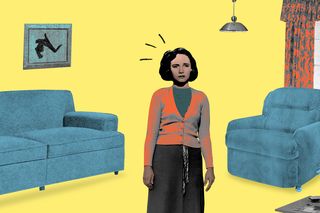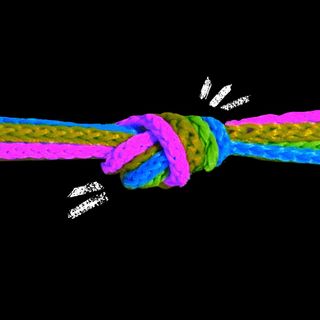
Is This Normal? “New Places Make Me Anxious”
An anxiety disorder appears to be at the root of this “fear” of new places. It has a name too: agoraphobia.

In this series, we dig into our strange phobias, fixations, and neuroses, and ask ourselves — Is This Normal?
It’s not like I’m totally against the idea of exploring new places. But the prospect of visiting unfamiliar territories induces dreadful bouts of anxiety in me. To familiarize myself with a new restaurant before a visit, then, I rely on the internet to see how it appears on the street and what its interiors look like, while frantically going through its menu. At times — albeit rarely — before setting foot into new homes of friends, I also end up looking up the floor plan of their building to calm myself down a tad. While the advent of the internet has certainly helped me, it hasn’t entirely eased my anxiety — not even close, in fact.
Turns out, not only do most people not obsessively study floor plans and interiors of new places they’re about to visit, but they’re not nearly as anxious as I am about being in unfamiliar places either. This forced me to question my behavior: is this normal?
Recently, I came across a relevant, relatable experience on an online thread. “I get scared of going to new places… Mainly [the] fear is because [I] don’t know what to expect from this new environment, where there are new people and surroundings… What helps me sometimes is to make sure I have someone I trust coming with me to the new place for the first time,” wrote a Quora user who admitted to living with acute anxiety. Indeed, having someone I know accompany me helps me too — especially if I’m going somewhere for the absolute first time. On subsequent visits, I fare just fine.
An anxiety disorder appears to be at the root of this “fear” of new places. It has a name too: agoraphobia. The fear triggered by the disorder can present in the form of symptoms akin to those of panic attacks — including trouble focusing, chest pain, fear-induced shivers, excessive sweating, hyperventilation, dizziness, nausea, and an upset stomach. Having experienced most of these when confronted with the prospect of visiting an unknown place, I can attest to them.
Related on The Swaddle:
Why Anxiety Can Sometimes Make People Feel Unsafe Even in Safe Environments
It appears, though, that my experience of the disorder is rather mild compared to those who can’t even leave their homes due to inordinate apprehensions about anything that lies outside the borders of their safe haven.
Research suggests that agoraphobia isn’t an extremely common experience — with only about 1.3% of adults living with it. However, the disorder is more common among women, compared to men — its prevalence among people outside the gender binary remains under-researched. What we do know about agoraphobia is that it’s among the most common forms of anxiety disorders that autistic people experience — although its experience is certainly not restricted to autistic populations.
As an autistic person, then, agoraphobia is, perhaps, an unavoidable experience for me. Especially so, since like many autistic people, my sensory processing issues make it important for me to have a handle on my sensory atmosphere to ensure I’m not so overwhelmed that I find myself on the verge of a meltdown. And unfamiliar environments, naturally, mean lesser control over said sensory atmosphere. That, in turn, translates into a greater — and not completely irrational — fear of new spaces.
But autism and agoraphobia aside, too, human beings are, in general, scared of the unknown — making uncertainty a core element of most anxiety-triggered experiences. “Uncertainty can intensify how threatening a situation feels,” Ema Tanovic, a psychologist, told BBC Worklife last year. It is uncertainty that induces anxiety while we wait to hear from the office we just interviewed for a position at, the broker we communicated our offer to, or the person we had a great first date with.
Related on The Swaddle:
How Extreme Self‑Focus Can Prevent ‘Shy’ People From Bonding With Others
Much the same way, the prospect of going to a new place, too, presents a host of uncertainties — how many bathrooms are there? Will it be too warm in the clothes one is wearing? What if there’s no mineral water available? Are there going to be plants that can trigger one’s allergies? Will the people there be nice?
At the root of the anxiety is a feeling that more people, perhaps, share in common: comfort in the familiar. The contours of home, which are innately forged into one’s muscle memory and daily routine, can reduce the cognitive load of having to deal with the uncertainties of learning an entirely new space from scratch.
While trying to find answers to as many of the worrisome questions as possible might be able to mitigate one’s fears of new places, it doesn’t do away with the anxiety. “When we worry, we think about the possible outcomes of an uncertain situation in an attempt to somehow prepare. In reality, worrying does not reduce the uncertainty we face and instead sets us up to feel more anxious,” notes Tanovic.
Instead, accepting that we can’t control everything might be more helpful, Tanovic believes. But the acceptance — especially in the face of debilitating anxiety obstructing clear thinking — can be hard to come by. However, a combination of therapy and medication might help people achieve that, experts say.
But before I look up a therapist who can help me overcome my anxiety about unfamiliar places, perhaps, I will Google the restaurant where I’m supposed to meet my friends this weekend. Then, of course, I’ll research therapists — and, unsurprisingly, what the interiors of their clinics look like.
Devrupa Rakshit is an Associate Editor at The Swaddle. She is a lawyer by education, a poet by accident, a painter by shaukh, and autistic by birth. You can find her on Instagram @devruparakshit.
Related


How ‘Bad Mothers’ Were the Victims All Along
